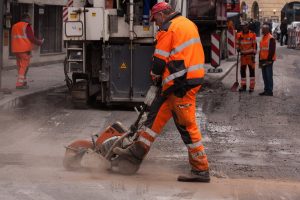Can Construction Workers Get Workers’ Comp for Hearing Loss or Impairment?
Getting workers’ comp for hearing loss can be complicated.
People who work in construction are among the employees most likely to suffer hearing loss or hearing impairment due to their jobs.
Typically, workers injured on-the-job in Massachusetts and Rhode Island are eligible for workers’ compensation, but collecting benefits for hearing loss can be an uphill battle.
Employers and insurers often deny workplace hearing-loss claims. They’re hoping you will believe them when they say you do not deserve workers’ comp. They want you to give up on pursuing what is rightfully yours.
Injured construction workers deserve compensation.
If your hearing was damaged because of work, do not give up on getting the compensation you deserve. Dig in your heels. Call us. We can help.
The Law Offices of Deborah G. Kohl, P.C. knows the truth about construction workers and workers’ comp benefits.
- 1. More than half of older construction workers have work-related hearing loss.
- 2. Work-related hearing loss is covered by workers’ comp.
- 3. Injured workers deserve compensation.
If you work in construction or another field and have experienced work-related hearing loss or hearing impairment, contact us for a free case consultation. Our law firm serves all of Rhode Island and southeastern Massachusetts. At no cost to you, we can explain how the law applies to your situation and your potential legal options.
Workplace hearing loss risks
Construction workers are 40 percent more likely to suffer work-related hearing loss than employees in other industries. According to a recent study, carpenters and boilermakers are among the construction jobs at the highest risk for hearing damage.
Loud noises come from jackhammers, concrete saws, crashing lumber, dockyard cranes, collapsing scaffolding, high-pitched warning alarms, gas leak explosions, drills, sanders, bulldozers, grinders, and other construction equipment.
Employers are required to provide you with a safe working environment. This includes protection against hearing loss and impairment. The risk of damage can be reduced when employers supply workers with adequate personal protective equipment (PPE) like earplugs and headphones. However, many employers don’t do this or provide poor-quality PPE.
How to prove workplace hearing loss
Unless your hearing loss is due to a catastrophic event, like an explosion, an adjuster might claim that your hearing loss is due to something other than work – like age, pre-existing injuries, hobbies, or lifestyle choices. We’ve even seen insurance adjusters with the nerve to accuse seriously injured workers of “faking it.”
At The Law Offices of Deborah G. Kohl, we do not accept these excuses – and neither should you. To prove your hearing loss to workers’ compensation authorities, our work injury attorneys use evidence such as:
- Thorough medical examination report.
- Audiometric report (a special test that measures your hearing abilities).
- Expert medical testimony.
- Witness statements describing how hearing loss has affected your life.
- Worksite decibel measurements.
- Regulatory investigations and reports.
- Recordings.
- Your own personal and powerful story of how work-related hearing loss has devastated your life and reduced your ability to communicate with and relate to the people around you.
Types of workplace hearing impairment and deafness
In general, there are three or four types of work-related hearing loss.
- Traumatic hearing loss – Typically caused by a single, loud event like an explosion, gunshot, or direct ear injury.
- Cumulative hearing loss – This is caused by repeated exposure to loud noises. The damage builds up over time, leading to hearing impairment, deafness, or tinnitus (ringing in the ears).
- Ototoxic substances – Chemical substances and toxic materials can do just as much damage to the ears as loud noises and physical force. In construction, common ototoxic substances workers may be exposed to include solvents like carbon disulfide, styrene, and trichloroethylene, as well as lead, mercury, and carbon dioxide.
- Dual exposure – Many construction workers are exposed to more than one type of hearing damage. This is called dual exposure, and it may heighten the risk of hearing damage.
Construction workers who are deaf or hearing impaired due to their jobs are entitled to benefits. Workers’ compensation pays for injury-related medical expenses, rehabilitation, temporary and permanent disabilities, and lost wages.
Compassion, experience, respect, results
Since the 1980s, the legal team at the Law Offices of Deborah G. Kohl has fought hard to get injured construction workers the compensation they deserve. Our law firm knows what it takes to prove that your hearing damage is from work.
We know how to obtain the type of evidence necessary to prove work-related hearing loss. If you have a hearing impairment, hearing loss, deafness, or tinnitus due to your work in construction, or another industry, contact us for a free case consultation to see how a work injury attorney can help you. We serve all of Rhode Island and southeastern Massachusetts, with offices in Fall River, Foxborough, and Providence.
Do not delay in reaching out. You must meet strict deadlines to successfully apply for workers’ compensation. A member of our team is available to hear from you anytime, day or night. Contact us today to schedule your free case evaluation.

